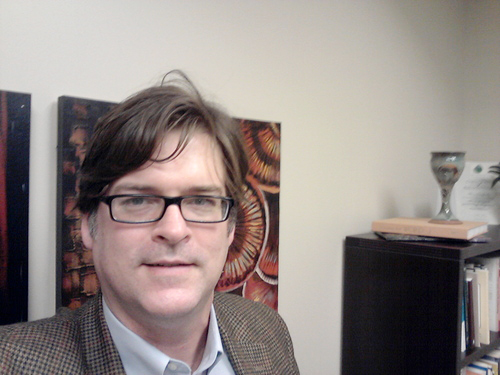After racing to Baylor University Medical Center in Dallas July 7 in response to reported injuries from sniper fire downtown, Chaplain Alan Wright didn’t know what he’d find in the emergency room.
He did know that into that “organized chaos” he would offer more listening than advice.
Two days past the intense trauma of that evening, Wright sobbed in the pew of Wilshire Baptist Church while listening to violinist Zoe Garrett play “Melody from Orpheus and Eurydice.”
“It was the saddest song I ever heard,” he said. “And there were no words. It just ripped me open. I was surprised at the emotions I was holding in myself, just because I’m a citizen of Dallas.”
The tragedy of five police officer deaths and seven other injuries — on the heels of the deaths of black men shot by police officers earlier in the week — reverberated far beyond Dallas, and Wright was feeling the pain of his city.

Hearing the story of his community told by someone else has given Alan Wright “new eyes,” he says.
“Whether you were on the front lines, or were a protestor or emergency room nurse or doctor, piled on top of that is just the feeling you have when your community has been a part of a tragedy like this.”
As a chaplain primarily in the oncology unit of a Level One trauma center Wright sees many traumatic days and wouldn’t declare the July 7 events his toughest. The difference in the Dallas shooting is that “you feel really keyed in to your entire community,” he said. “You’re grieving in yourself and for an entire group of people.”
“There’s not a lot of advice-giving on a night like that,” said Wright, a chaplain for 16 years. “You’re giving prayers where they are needed, giving hugs, trying to normalize the extreme emotions that people are feeling. It’s not a time to try to govern how a person might feel. You can’t tell someone it’s going to be all right.”
Most of Wright’s work related to the tragedy has been done in debriefings since the night of the event, helping staff come to grips with what they saw. He attended to people who often are forgotten in the aftermath of such an event, such as dispatchers who received the flood of calls and saw it all unfolding in a dark room on little TV monitors.
“When they took the job they probably didn’t sign off on having to see all they saw,” Wright said. “There is trauma in just being a part of it and seeing things they don’t want to see. I encouraged them to tell their story and praised them for the job they did. Training is one thing, but when it happens, that’s another.”
“We talk about how we’re going to remember that day all of our lives. But hopefully, as Frederick Buechner said, ‘God gives us the gift of a failing memory.’”
Trying to make sense of it himself from his experience as a Christian minister, Wright hopes tragedy can become a seedbed from which “something beautiful might arise.”
He remembers about 75 Baylor hospital employees crowding the emergency room. They had poured in to help without being asked, people from cooks to surgeons. He recalled people huddling together protecting others who had been in the Black Lives Matter protest march that ended in gunfire by a lone sniper.
The image of doctors and nurses waiting for the next injured person to be wheeled through the door sears his memory and he knows “there is more good than bad, more beauty than pain in the world when I see people respond like this.”
Reconciliation takes risk
Wright is a member of Wilshire’s Racial Reconciliation Committee, a role he calls his favorite part of the church. He says churches can lead the way to reconciliation “if they’re willing to take some risks” and see the community as their flock, rather than just their own neighborhood.
Reconciliation will never come “until we start telling the same story,” he said.
On Sunday mornings in churches in different parts of town, “we tell different stories. Tragedies like this will have us telling closer to the same story about our community, where suffering and discrimination have existed for a while.”
Christians can take a risk, get out of their comfort zone and share meals “with people who don’t look like us.” Or, he said, “they can go into their houses and lock their doors.”
He fears Christians will “spiritualize” the tragedy and its aftermath and continue to avoid the difficult conversations.
He admits that being a part of the Racial Reconciliation Committee and hearing fellow Christians who have a different story has given him a new perspective that affects his life in many ways, from where his children go to school to how he spends his money.
Until then, he’d heard only the white history of Dallas and had no context for another story.
Then “you sit across the dinner table with someone and you hear that personal story of discrimination and you can’t trade that for anything,” he said.
The shock of “hearing the story of your community told by someone else” has given Wright “new eyes” and he feels his work on the Racial Reconciliation Committee is the most important thing he’s doing.
Originally from Pascagoula, Miss., Wright is a graduate of Bright Divinity School at Texas Christian University in Fort Worth. He’s been a member at Wilshire for 15 years and is married to Tiffany Wright, Wilshire’s minister for care ministries.
